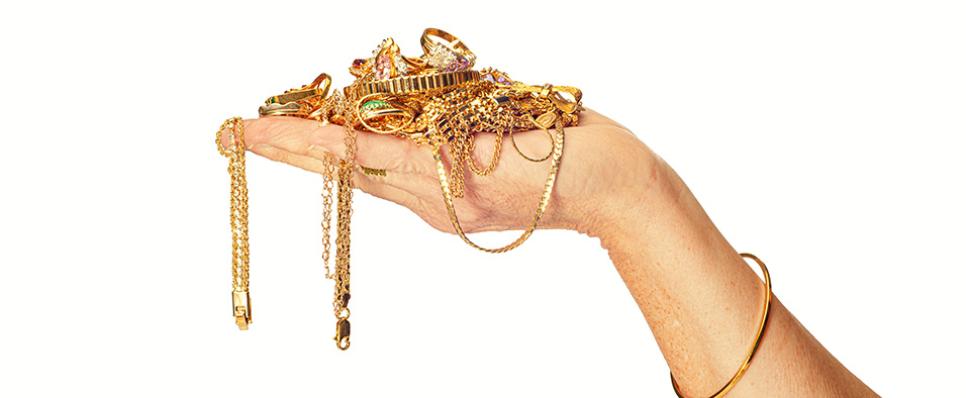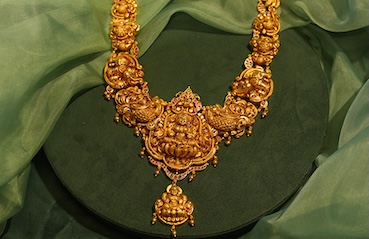Published: 21 Oct 2020
Here's how inherited gold is taxed in India

In India, gold carries over from one generation to the next as a prized inheritance. It not only provides you with financial security, but can also be one of the most valuable and exquisite additions to your collection – be it gold jewellery or physical gold or antique and heirloom bars and coins. Taxation on gold in India is charged through GST on the sale or purchase transaction, while profit made on it is taxed in the form of capital gains tax.
So, how does taxation work for something that you own only because you inherited it?
Taxation on gold is imposed under the category of capital gains tax. Under this, profits or gains made from the sale of a capital asset such as inherited gold is considered as 'income'. In the year this income was earned, the profits are taxable.
While a bill or some documentary proof of your gold ownership is required, proof of inheritance varies from case to case. It can be:
- Will mentioning the inheritance
- Wealth tax payment proof
- Past valuation reports (if tax has not been paid)
- Receipt for jeweller that has been remade
- Gold mortgage receipts, in case the gold was pawned
- Insurance receipts for home (where gold is also insured)
- Old photographs
- Evidce to prove that it was a gift
For tax calculation, however, the inheritance date is not considered as an ‘event'.
There are important aspects to be considered while taxing gold. Some of these are:
- Duration of ownership
- Purchase cost
- Indexation benefits
Inherited gold is not a case of straightforward sale and purchase. You do not need to pay tax just for inheriting gold. However, if and when you eventually sell your inherited gold, you will be taxed on the profit earned. Let's take a closer look at how this tax is calculated.
Related: Understanding capital gains tax levied on gold in India
Factors involved in calculating tax on inherited gold
Cost of acquisition:You will not incur any cost while acquiring the gold as you have inherited it. However, for tax purposes, the cost of acquisition (that is, the total expense incurred when an asset is inherited or purchased) is taken to be the price at which your parent or relative purchased the gold. Therefore, it is important to retain the receipt or invoice obtained at the time of purchase.
Another option available is the consideration of the fair market value (FMV). If the gold was originally purchased before 1 April 2001, the FMV as on 1 April 2001 can be considered as the cost of acquisition. In case the invoice is missing, the gold can be evaluated by an income tax-registered valuer based on the transferor’s date of acquisition. The valuation must be done as on the date of acquisition by the transferor or 1 April 2001, whichever is later.
Long-term capital gains tax is applicable on inherited gold only when it is held for more than 36 months. The indexation benefits can also be availed of only after you have had the inherited gold in your possession for more than 36 months.
Indexation:Indexation ensures that you do not lose most of your capital gains in tax payments. The cost of acquisition is inflation-corrected based on the cost inflation index(CII), a chart that is confirmed by the Income Tax department. The table below explains how inherited gold is taxed if it is sold after owning it for a long period. Logically, the sales proceeds minus the original cost of acquisition is the taxable profit. However, indexation inflates the original cost of acquisition, reduces the book profit, and thus reduces the capital gains tax payable.
Here's how indexation reduces capital gains tax. Do note that the profit is reduced only for tax calculations and doesn't impact the earnings you actually male.
| Without CII (Rs) | With CII (Rs) | |
| Sale value | 300 | 300 |
| 100 | 280 | |
| Profit before tax | 200 | 20 |
| Tax | 40 | 4 |
Indexation lowers the profit and subsequently the capital gains tax, thus benefiting you, the seller (inheritor).
Related:Tax implications on gold gifts
Period of holding: Capital gains on the sale of inherited gold – in fact, any capital asset – is calculated on the basis of the period of holding. If the period of holding is less than three years, short-term capital gains tax is applicable. For inherited gold held for over three years, long-term capital gains tax becomes applicable. The period of holding includes both the period of holding of the inheritor as well as the period of holding of the original owner.
In the case of short-term capital gains, the gain is added to the taxable income of the inheritor and the rate of tax is charged as per your applicable income slab. On the other hand, long-term capital gains attract a flat income tax rate of 20%, irrespective of your income slab.
Earn income on your inherited gold without taxation
If you are looking to earn income from your inherited gold without selling it, you can deposit it under the gold monetisation scheme (GMS) and earn interest as per the market-linked price of gold. This income is exempt from tax, so neither the initial deposit nor the interest earned thereon will attract any capital gains tax or income tax. So, GMS is a great way to earn from inherited gold without attracting any tax liability.











